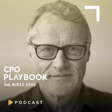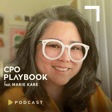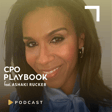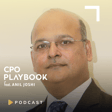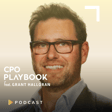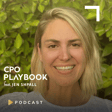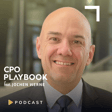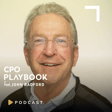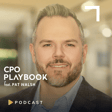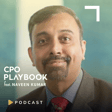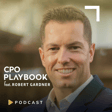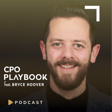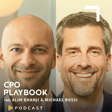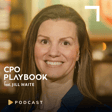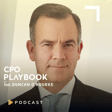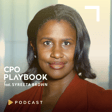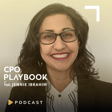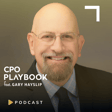Introduction to CPO Playbook and Episode Overview
00:00:01
Speaker
I'm Felicia Shakiba, and this is CPO Playbook, where we solve a business challenge in every episode.
Why Do 90% of Startups Fail?
00:00:14
Speaker
The reasons behind the failure of 90% of startups are multifaceted, making it challenging to attribute to a single cause. While some attribute this failure to insufficient funding, acquiring funding itself necessitates an entrepreneurial mindset.
Entrepreneurial Mindset Traits
00:00:31
Speaker
but what exactly constitutes an entrepreneurial mindset? And how can it be fostered within a founding team to facilitate better decision-making? In her article on the three traits of an entrepreneurial mindset, Meredith Summers highlights the importance of being solutions-oriented, adaptable, and anti-fragile.
Importance of Entrepreneurial Mindset for Startups
00:00:52
Speaker
Today, Jason Park, CEO and co-founder of Coldcart,
00:00:56
Speaker
shares his insights on the significance of an entrepreneurial mindset in launching a startup. He stresses how the success of his team members depends on cultivating this mindset and offers strategies for nurturing it within the team.
Coldcart - A Case Study in Shipping Innovation
00:01:12
Speaker
Jason, welcome to the show. Thanks for having me, Felicia. Glad to be here. We're excited to have you. Jason, could you please start by introducing Coldcart and explaining the core problem your company is focused on solving
00:01:27
Speaker
And so we are a technology platform for e-commerce friends with perishable products. So specifically if your product is frozen or refrigerated, think like a meal chip or a frozen box of steaks or something like that, it is prohibitively expensive and prohibitively complicated to ship to your customers because the product spoils. So because the product spoils, you have to constantly change how you ship
00:01:55
Speaker
based on the temperature and the weather, on-time delivery. And you have to do that while getting the lowest cost possible. This is just so unwieldy for companies. So we've created a technology platform that automates process across warehouses, shipping carriers.
00:02:11
Speaker
We figure out down to the level of each individual box, how many packs of ice should you put in that box, for example. And all of that runs through a single kind of plug and play platform. And so companies on our platform are typically saving about 15 to 50% cost per shipment.
00:02:28
Speaker
And we've been reducing spoilage and refunds from lake shipments by about 52%.
Entrepreneurial Mindset Beyond Startups
00:02:34
Speaker
So just getting started, looking forward to continuing to scale this business. It's been quite a journey. We've got a great team that we've been fortunate to bring on to do that with us. It's a pretty impressive problem you're taking on. It's very detailed and it sounds like you've put a lot of work behind coming up with a working solution.
00:02:54
Speaker
I'd like to refer to an article I read by Meredith Summers, and in her article on the three traits of an entrepreneurial mindset, it highlights the importance of being solutions oriented, adaptable, and anti-fragile. Are these competencies important to you? Do they apply to your world?
00:03:17
Speaker
It definitely resonates, whether it's at Cold Code or other situations I've been in where we were creating a new business or frankly just solving a problem in a way that hadn't been solved before. And I think what also resonated about the article was the argument that
00:03:35
Speaker
Yes, startups definitely need this, but startups alone can't solve all the world's problems. You need large corporations, you need government, you need NGOs who also have an entrepreneurial mindset and can solve problems when you think about it. That's a lot of people who need to have this entrepreneurial mindset.
00:03:54
Speaker
And I think one thing that I've often thought about in this context is, I think it's commonly believed that the entrepreneurial mindset is a set of innate personality traits, who you are versus something that can be hacked. And yeah, I think what they have really been trying to do is try to think of it not necessarily in terms of personality traits and sort of things that are innate and inalienable, but, you know,
00:04:21
Speaker
What does it look like when people who have this mindset work? How do they approach a problem? What's distinct about that? And maybe by getting to a more framing of it that we could kind of help more people have that kind of mindset or kind of solve problems in the way that I agree with the article is needed in our society. But yes, it definitely resonates. And so as you continue your journey, how does the definition of entrepreneurial mindset take shape for you?
00:04:49
Speaker
our customers are trusting us with one of their most, if not the most mission critical process they had, the sort of fulfillment of an order and the delivery of that order to a customer.
Understanding Underlying Causes for Better Decision-Making
00:05:00
Speaker
That touches every sale they make. And it's a process with a lot of steps, then a lot of details below the surface, and frankly, a lot of entrenched views on how those steps should be performed.
00:05:15
Speaker
And so from a kind of as we're developing our product in our business, you know, actually I'll just kind of twofold. One was that because this is such a mission critical process, the bar on quote unquote minimum viable to use that kind of product management term, there's a very high level of minimum viability of every step of that process and a very high bar that
00:05:38
Speaker
customers are exactly clear for them to essentially trust you with their business and their customers. And so how that shows up at Cold Card, there are sort of three things that I've observed, you know, with a team and myself and just thinking about these things. And it comes down to how do these people work? How do they approach problems? I think there are kind of three factors that I think sort of show up consistently. One is a focus on
00:06:06
Speaker
why over what you get a lot of information every day you talk to people you see and hear a lot of things but this is really about going beyond what you see and hear and really digging for underlying causes origins motivations that's that level where you actually start to solve problems in ways that are
00:06:28
Speaker
different and better, but you have to be the one to dig for those types of insight. They don't present themselves. Think about, for example, every company we meet, every brand we meet usually will say something in the beginning, like, Oh, I want to ship through UPS. Why do you want to ship through UPS? Oh, because I have discounts at UPS. Okay. Well, how's your outside delivery? Oh, I am refunded 10% of my shipments here this past month because a lot of late deliveries.
00:06:59
Speaker
I've got to ship them through UPS, but what if I can solve both your problems, cost and on-time delivery? What if I can do that by picking a different carrier for every shipment based on what the cost or the on-time delivery is? And nothing actually started to move the curve forward in terms of being able to get to not just better cost, but also better on-time delivery through a different model. But you don't get through that kind of solution, I think, unless you're asking the right questions.
00:07:20
Speaker
And so it's like, okay, I want an interpretation of that.
Progress Over Perfection in Business Strategy
00:07:28
Speaker
I think a second quality that manifests, I think, how people with the entrepreneurial mindset approach to work is this idea of progress before perfection. This is an idea that's become widely accepted over the past couple of decades with your agile product development, needs startup and things like that. It means one, that you don't let unknowns stop you from moving forward, but rather you use those unknowns as hypotheses to text and you just turn them into knowns.
00:07:56
Speaker
It also means being very aggressive and very precise about deciding what do we actually need to solve versus what can wait to be solved until later. That can be very difficult. I do think this gets kind of misunderstood often as justification for lazy sloppy words. And we'll just put it out there. The question was, let's also tell us what they want.
00:08:18
Speaker
Sure, the customer is the ultimate judge, but a customer is not going to sort of forgive a crappy product because, oh, we run an agile development process. You both might try to sell that to the customer, right? But really, it doesn't have to be slow. It just means that just like everything else about the startup, be resourceful and fast about using what you have available with data, whether that's how they are for starting to necessarily think about potential failure scenarios.
00:08:42
Speaker
Just this idea that we are so decisive or you are so decisive about what's important to know and what's not. And you don't let the unknown stop you. I think in one way that's manifested at Cold Current is we made a decision very early on in our product development to focus first on the physical shipping outcomes before we really got into
00:09:05
Speaker
optimizing and fine-tuning the user experience. Because ultimately, what job is our customer hiring us to do?
00:09:13
Speaker
They need their boxes shipped. And while we may not physically touch the boxes, they're entrusted us to make sure the right things happen with those boxes. What matters is what happens to the shipments and that the work gets done. And a lot of us kind of come from environments where UX is very important and we have a lot of passion about that and shoot a step sometimes and say, all right, well, we're going to focus on that later. And our standard for UX is it just
00:09:39
Speaker
shouldn't get in the way. And now that we've got the foundation for the platform, that the operations side of it really works and works very seamlessly and scalably, that now we've really shifted to say, all right, now let's come back to the UX and think about, all right, the day-to-day users of our product and how can we make their lives more efficient, how can we give them better information, faster and in better ways, and then self-service and things like that. But there was a decision to say, one comes before the other,
00:10:07
Speaker
versus trying to solve all of it at the same time because it's all kind of part of the same product. And then I'd say the third. Before you get to your third point, I wanted to ask, I've seen a lot of people struggle with this point progress over perfection because they really
00:10:24
Speaker
are perfectionist and they're extremely good at what they do and they can't hold themselves to a product or the work that they do and see something either unfinished, leave their fingertips. I'm just curious, how does someone successfully deal with that type of situation?
00:10:42
Speaker
It is very hard to do in practice. And frankly, we are taught in school to be the opposite of this, right? Your job is to learn the material, complete your assignments, and answers are right or wrong. And we're taught to be completionists. So we're taught to do the whole thing. And it's very binary. Oh, well, biology is more important than social studies. So I'm going to focus most on biology and not going to do any social studies. You can do that, right? But then you get penalized through
00:11:10
Speaker
a lower rage. We're disincentivized to do this from early on in our lives. So it is challenging. I think one thing that our team has done really well is we've really built a process around ensuring we do this. Our head of product here runs this great process where we get together every month. Let's call it better table. And for product ideas and priorities are accumulating kind of throughout the month and then they all get reviewed in conjunction with each other.
00:11:34
Speaker
during this bedding table process. And then we allocate points across and say, OK, well, this one's going to get five weeks' worth of engineering time versus two, et cetera. And then that is the work that's then done the following month. And it all watches before the end of the month. And so what that does is, just like we were talking about earlier with Bookless Aut, with the back end versus the front end, new user experience at first, is it forces us to
Embracing Ambiguity for Creativity and Innovation
00:12:00
Speaker
prioritize. Because at the end of the day, everything is important. People don't just
00:12:04
Speaker
create bad product ideas for the secret creating ideas. Yeah, it creates these ideas because they matter and they are important. It's what's so hard about it, but it ensures that we're constantly forcing ourselves to prioritize, as well as it keeps us focused on output and ensures that we are continually to ship features, that we're continually to not just talk about ideas, but actually publish and put things out. And I think process has been one way our team is
00:12:29
Speaker
You really come up with a good way of helping us make those decisions collectively and have that mindset because it's very hard because even so we're taught from birth, essentially, that this is not how the world works. And all of a sudden you get into business and startups and centers like, oh, no, that's going to do it completely different. Right. I really like that idea, the betting table. OK, so I'm going to let you hit on your third point. Go ahead. The third way that I think an entrepreneur
00:12:57
Speaker
mindset has shown up at Hold Card is people, team members, really seeing ambiguity as opportunity. And what that really means is sometimes there's a way that this is the way things are done. And it's the opposite of that. It's, oh, we don't have a way to do that yet. Or there isn't a way to do that yet.
00:13:15
Speaker
And the people who I think kind of have these traits look at that as opportunities to take ownership, to create, to build something worthwhile. And in many ways, just like we talked about with this idea of progress over perfection, that this is also not
00:13:33
Speaker
intrinsically wired into us. Humans are biologically wired to fear ambiguity and to crave. There's a lot of good sort of biological reasons why that makes sense. Startups are entirely ambiguity because nothing exists yet, and so logically startups equal fear.
Challenges in Hiring for Startups
00:13:52
Speaker
And while the idea of being in a startup and having a big blank canvas to create all these solutions is very exciting, the experience is different. And it is scary. And you don't always know what to do, or there is no clear right or wrong answer.
00:14:08
Speaker
And a great example or one example has really kind of shown itself in action is something that could have been very simple and kind of a chore, which was that we got to a point in our company where we needed a CRM system to manage all the sales league, the different sales conversations happening.
00:14:26
Speaker
Part of the answer to that is you'll find a tool. So when we decided to use HubSpot, but the other part of that's how you use that tool. A lot of companies will just take something like HubSpot and implement it and call it a day. Our team, and it was really cool to kind of watch this. You get almost like even though 100% or more, you can like see the energy kind of coming through with that.
00:14:45
Speaker
The virtual room, so to speak, is that she really saw that as an opportunity to really build a best-in-class sales machine. They're kind of like, look, we can use this to make ourselves faster. We just hired our first full-time sales hire. There was a lot of kind of just work with you.
00:15:00
Speaker
how do we really make this into an advantage for us? And I think the team in this case really saw this black space and saw that as an opportunity to not just sort of hope the gap gets filled with something off the shelf, but really to create and to define what do we want our sales process to be like? How can we move through these deals as fast as possible with as high kind of close rates as possible? And a lot of great, I think, insights and kind of findings and discoveries just even came out of the process of doing that. And so I think that's a,
00:15:29
Speaker
example of when ambiguity is opportunity and when people really see that. I like that you framed it as ambiguity as opportunity. I've heard this competency shared as dealing with ambiguity, but I think you said it better. And when I first came across this competency, when I was getting certified by Corn Ferry Internationals 360,
00:15:53
Speaker
executive coaching report. When you get that type of certification, you're actually shown all of the statistics around each competency. And this particular competency, I can tell you, is the most challenging for anyone to achieve. It's like one of the top
00:16:11
Speaker
And it's actually like one of the most desired. And so I think that there's a lot to say when someone works in a startup because startups are always known to have this ambiguous factor. And if someone can get through that.
00:16:26
Speaker
I think it's really admirable to see that people can actually successfully view ambiguity as an opportunity. So I agree with you. I agree with all of the three points that you made, which leads me to my next question. And I want to understand because knowing how important an entrepreneurial mindset is, I'd love to learn what were the biggest hurdles you faced during the initial stages of hiring for your startup. And how did you address those?
00:16:55
Speaker
hiring the people to begin with because you think about what does a startup look like at the very beginning. I was a guy working out of my basement. There's no business. There's no product yet. And say, Hey, like
00:17:07
Speaker
We've got a lot of great equity we can offer you. And one day this will be worth so much money. But right now it's pieces of paper. And I think that, because especially these days, people find the idea of startups very exciting. But I think that in the hiring process, people really do self-select. And there are a lot of offers that I made before.
00:17:28
Speaker
Finally, someone decided to join, who is our CTO, who is still with us, you know, despite having to work with me. It was interesting that you actually were talking about things like ambiguities, control, fear, and things like that. They go along with that. That when I've made offers to these people and we're really going through the process of, you know, they were going through the process of, do I want to, you know, leave what I'm doing and do this startup?
00:17:50
Speaker
The amount of existential anxiety that came out in those conversations, I mean, so much more than hiring for role at a more established company or something like that, that because you really psyched.
00:18:03
Speaker
The type of risk that goes into joining a startup really gets into these sort of fundamental kind of who we are as people and what is an archetypal risk and how do we sort of face challenges a lot like the entrepreneurial mindset article is describing, anti-fragile, things like that.
Role of Co-founders in Risk Management
00:18:19
Speaker
And again, not to say that people you can join are therefore fragile. No, of course not, but it's just a specific typo.
00:18:25
Speaker
kind of risk and sort of challenge that you put yourself through. And it's actually, I even had one person who pretty senior person in their career who deliberated for weeks on, I really want to do this, but I'm just not sure. And the thing that ended up pushing them to not do it, they're sort of big signal from the universe was that they just started remodeling their house. Yeah. The cost of the house remodel was the straw that broke the camel's back eventually.
00:18:51
Speaker
I do think this is an area where having multiple co-founders helps because then you're not the only crazy person that someone sees. They see that there are other people who are also committed to the mission.
00:19:06
Speaker
And in my case, even though I was the only full-time employee at Cold Card in the beginning, I did have three co-founders who had exited startups previously, and very successfully, one of them was the founder of Blue Apron, which was the company that essentially created the perishable e-commerce industry that we sell to now at Cold Card.
00:19:27
Speaker
And so I think this helped give us credibility and legitimacy that helped the people who joined us in the early days kind of get over that hump, you know, strike the numbers.
00:19:38
Speaker
Even last week, I was telling our CTO, Joe, as soon as you joined, you de-risked this thing for everyone else by more than 50%. So now it's not just me and who they see who's crazy. There's someone else who's bonded to this as well. And so each person who joined Cold Card made me just a little less crazy in the eyes of everyone else who joined afterward.
00:20:05
Speaker
They reduce kind of the risk for the next person and the next person. When you reflect on your experiences, are there any insights you wish you had gained earlier or actions you would have taken differently concerning talent and people related challenges?
00:20:22
Speaker
I think that's a question that in some ways never reaches a final answer because every specific person is different, every specific situation is different, and a lot of times you don't really know how effective something you did was in this regard until later.
Balancing Abstract Thinking with Action
00:20:41
Speaker
But when I've tried to assess myself on the three dimensions we talked about based on things people have told me I've done better on versus worse on,
00:20:50
Speaker
You know, starting with this dimension of why over what, this idea that you abstract away from specifics and get to another level of why, root causes, etc. As someone whose Myers-Briggs personality type is very high on the intuiting and conceptual dimension, for me it's almost easier to use an analogy than it is to say something specific.
00:21:14
Speaker
And so I naturally get a lot of energy from this type of thinking and dialogue. I think that at Cold Card as a team, we've been fortunate to build a team of people who are naturally curious, who are high on critical thinking and generally not content to just accept the first answer they get. If you listen to our meetings, you hear a lot of
00:21:38
Speaker
questions like, well, what are we really trying to solve here? Or, you know, why does that matter? And I think these types of questions that get to or help get to the root cause of different things you're seeing. And where I have to challenge myself in this regard is to not abstract so much that what I say is too open-ended that
00:22:01
Speaker
It leaves too much room for people to diverge in what they take away and understand and that makes it harder to get to alignment later. At the end of the day, why still has to turn into what? Because we're building something and that's why we exist. And so I have to find ways to check myself on whether I'm being specific enough
00:22:24
Speaker
I always ask the people I work with to call me out if I'm not being specific enough or it's not clear what the action is. I just have to remind myself to be mindful of that slippery slope. Obviously, I value rigor. I have a lot of questions and ask those questions in a way that doesn't either slow down the process or seem like it's slowing down the process.
00:22:47
Speaker
Right. And they kind of remember that is a slippery slope. I think having an institutional process helps, but then also I think for any one of us, I want to start up as a leader. So I'm a little player. That's like how we kind of ask those questions, how it gives feedback and just kind of remembering that these things tend to get overly interpreted as too little.
Diverse Thinking Styles in Problem-Solving
00:23:06
Speaker
It's a delicate artful balance. It is. And it's kind of like this one, I'd say even more and the other two are kind of more
00:23:13
Speaker
concept tug of war, that you sort of have to keep pulling on it to make sure you have the right balance across both. And then in terms of ambiguity as opportunities. So I think of a weird person in the sense that I actually get a lot of energy from ambiguity that for me, ambiguity is actually.
00:23:32
Speaker
read them and I know we're talking about that kind of in a positive sense of this discussion, but really I'm refranking on Boris, maybe a personality flaw that I have or something, but I personally, I was volunteering in a food bank in Chicago where I lived the other day and they could do this set of art, follow these 10 steps to pack these boxes that we're going to ship out. And without even knowing, of course, I'm like, I don't want to do that. I want to upgrade my own process. I should have been in my own process. And I wasn't even really aware of it. And then somebody came by and they were like, what? All these different from everyone else.
00:24:03
Speaker
I know. So, and I think part of that's also like the learning or the thing that I had to constantly sort of hold myself accountable to is that remembering that I'm kind of weird in that regard and that most people have different levels of ambiguity tolerance. Most people have different ways to deal with their responder ambiguity with a player or create structure. Some people just want to go spend an hour talking through it. And then that's how they kind of get comfortable with it. I think as a team, we've sort of.
00:24:30
Speaker
got to eat better knowing what each other needs and incorporate that into how we work almost self consciously at this point. Remember when I started out as a new consultant at Bain and Company where I used to work, they kind of get all the new post MBA consultants into the same hotel in Miami from all the little offices every year and they do everyone changed together and they do this exercise where they actually use a Myers-Briggs and you take your Myers-Briggs and see where your hyping is and they do this exercise where a facilitator stands up and says,
00:24:59
Speaker
Okay. We're going to walk through now and literally walk through an example project for clients. And they're like, okay. And different things, milestones happen in the project. And, oh, quite just sent you one out of 10 pieces of data. If you're an end to it in kind, hit 10 steps forward. If you're asked someone who's more sensory and concrete by nature, take two steps forward. And what it shows you is that different people get to the answer. They ultimately get to the answer, but they get there.
00:25:28
Speaker
in sort of their own cadence and through the way they get there and the whole sort of moral of the exercise is that everyone handles anything really differently. It's important that we are aware of that and consider that and build that into how you work
Conclusion and Call to Action
00:25:43
Speaker
together. And for me too, it's also someone who's very much like, well,
00:25:46
Speaker
What are the quickest numbers we can get? Oh, that did exist. Let's use that. Oh, it's probably 80% correct. Right. And that someone, others out here, they were more like, we really need to plan our process. And seeing how they had an advantage to have the beauty of making sure I'm also learning as much as I can from them going through that exercise, the insight that come out of that. And then also just ensuring that I'm building enough of that into my own process and the way I work with others on the team. And I think you're really doing a fantastic.
00:26:13
Speaker
job at Cold Card, having this reflective conversation on how these apply. It's clear that this is why you're so successful and where you're at today. So Jason, thank you so much for your time and for being with me today and sharing with our listeners how to really cultivate an entrepreneurial mindset. So thank you for being here.
00:26:39
Speaker
Thank you so much. I really enjoyed this and appreciate the chance to spend this time with you. That's Jason Park, CEO and co-founder at Cold Card.
00:26:51
Speaker
If today's episode captured your interest, please consider sharing it with a friend or visit cpoplaybook.com to read the episode or learn more about leadership and talent management. We greatly appreciate your rating, review and support as a subscriber. I'm Felicia Shakiba. See you next Wednesday and thanks for listening.

